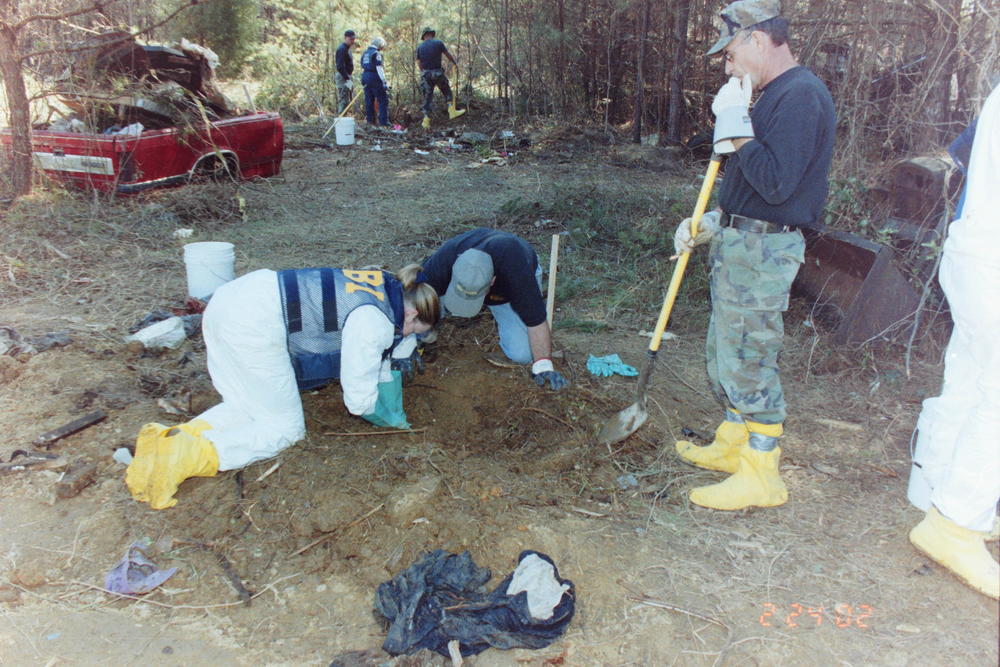
Section Branding
Header Content
Georgia Today: Ga. ranks low for womens health; Pathways to Coverage; Crematorium podcast
Primary Content
LISTEN: On the Monday, Aug. 19 edition of Georgia Today: A new report says Georgia is one of the worst states for Women's health; Gov. Brian Kemp announces lowered expectations for the state's Pathways to Coverage program; and a new podcast explores why so many bodies were found around a crematorium in Northwest Georgia more than 20 years ago.

Peter Biello: Welcome to the Georgia Today podcast from GPB News. Today is Monday, Aug. 19. I'm Peter Biello. On today's episode, a new report says Georgia is one of the worst states for women's health. Gov. Brian Kemp gives an update to the state's Pathways to Coverage program. And a new podcast explores why so many bodies were found around a crematorium in Northwest Georgia more than 20 years ago. These stories and more are coming up on this edition of Georgia Today.
Story 1:
Peter Biello: Today is the first day Georgia voters can request an absentee ballot for this year's general election. It comes as Democrats come together in Chicago for the first day of their national convention. Georgia convention delegate Stone Mountain Rep. Billy Mitchell says the party is ready for a sprint to November.
Billy Mitchell: I am seeing a unification at the speed and enthusiasm that I have never seen before, including the Obama campaign.
Peter Biello: He expects gratitude and a passing of the torch from opening night Speaker President Joe Biden. Georgia U.S. Sen. Raphael Warnock also is scheduled to give a primetime address tonight, highlighting his rising national profile and Georgia's status as a political battleground. Vice President Kamala Harris is expected to accept the party's presidential nomination on Thursday.
Story 2:
Peter Biello: A report from an organization that advocates for equity in health care, ranks Georgia among the worst states for women's health. The Commonwealth Fund says the state has several key issues to address. GPB's Ellen Eldridge has more.
Ellen Eldridge: The report specifically mentions maternal and infant mortality, access to care and high rates of uninsured women due to the state's failure to expand Medicaid. The Fund's Sarah Collins is the lead author of the report.
Sarah Collins: And women's inability to afford needed health care of all kinds is most pronounced in states that haven't expanded their Medicaid programs. And we see that — that pattern play out in Georgia in particular.
Ellen Eldridge: Georgia is one of 10 states, including Texas and Alabama, that has not expanded Medicaid. The scorecard ranks Georgia 46th overall for women's health. For GPB News, I'm Ellen Eldridge.

Story 3:
Peter Biello: Georgia is moving forward with a state-based health insurance exchange. This means things will look a little different this fall for people looking to buy health insurance coverage during open enrollment. GPB's Sofi Gratas has more.
Sofi Gratas: In 2019, Georgia Gov. Brian Kemp signed the Patients First Act, in part to move Georgia away from the federal health insurance marketplace. In November, that move will be complete and thousands of people will be redirected from HealthCare.gov to GeorgiaAccess.gov. One change: Private health plans will also be featured alongside subsidized plans. It will also direct people to insurance navigators and brokers. Insurance Commissioner John King said during a meeting Monday that a state-based exchange gives Georgia more options to adapt.
John King: Georgia will no longer rely on federal government for technology outreach, enrollment assistance and plan oversight.
Sofi Gratas: King said a state-based exchange also redirects user fees from the site to Georgia, rather than to the federal government. For GPB News, I'm Sofi Gratas.
Story 4:
Peter Biello: Georgia Gov. Brian Kemp said today that fewer people are eligible under the Governor's Pathways to Coverage program by around 70,000 enrollees. Pathways is open to people up to 100% of the federal poverty level, but requires those enrolled to prove 80 hours of work, volunteer time, or education each month in order to receive coverage. Just over 4,000 people had enrolled as of July. Gov. Kemp blames the low enrollment on Medicaid unwinding and a delay in the program's start, fueled by court battles with the federal government over its legitimacy.
Brian Kemp: So we've had a tremendous amount that the agency's had to fight through. We're just now on the other side of that. So you're going to see 100% effort going into Pathways and access continue.
Peter Biello: To get more people enrolled, the Department of Community Health has launched a new marketing campaign in Atlanta and other parts of the state.
Story 5:
Peter Biello: A Georgia sheriff's deputy was shot and killed in the town of Hiram, northwest of Atlanta, over the weekend. 30-year-old Deputy Brandon Cunningham of the Paulding County Sheriff's Office was shot in what police say was an ambush while responding to a domestic dispute. The suspect took his own life. The wife of the suspect was also shot, and she was taken to an Atlanta-area hospital in stable but serious condition. The Paulding County Sheriff's Office says Cunningham is the first deputy in the office's history to be killed in the line of duty.

Story 6:
Peter Biello: Athens-based Terrapin Beer Company is being purchased by Tilray Brands. Tilray made the announcement last week, saying the acquisition of Terrapin and three other breweries from Molson Coors Beverage Company will set the company up for growth. Among other brands, Tilray owns Sweetwater Brewing, which has facilities in Georgia and Colorado. Founded in 2002, Terrapin is currently sold in 13 states.
Story 7:
Peter Biello: CBS plans to film the first new daytime soap opera in 25 years at a studio north of Atlanta. That's according to a local official with the International Alliance of Theatrical Stage Employees, a union that represents many workers in film and TV productions. The daytime drama, called The Gates, was announced earlier this year. It's described as the first Black-led daytime soap in 35 years. The union official says production is expected to begin in November at Assembly Studios in Doraville.
Story 8:
Peter Biello: A woman says a stranger followed her family around an airport terminal and onto a Delta Air Lines plane, even though he didn't have a boarding pass for the flight. Delta Air Lines said Friday it's looking into the incident, which happened earlier this month at Dulles Airport near Washington, D.C. Delta says gate agents and flight crews have ways to verify that people are allowed onto a particular flight. The airline says it's reviewing this case and has contacted airport authorities.
Story 9:
Peter Biello: A statue of John Lewis was installed over the weekend in Decatur. The large bronze statue of the late civil rights icon and Georgia congressman depicts Lewis with his hands over his heart. It replaces a Confederate monument that was removed in 2020. The John Lewis Memorial is set to be unveiled on Saturday.
Story 10:
Peter Biello: The South Georgia city of Moultrie plans to celebrate its hometown Olympian tonight. 20-year-old Carson Tyler is returning from the Paris Games to a parade in his honor. Tyler narrowly missed earning a medal in diving, placing fourth in men's 3-meter diving. After the parade at 6 p.m., he's expected to receive the keys to the city and greet fans. He's one of about four dozen athletes with Georgia connections who competed in Paris. That's according to official U.S. Olympic broadcaster NBC.
Story 11:
Peter Biello: In baseball news, the Braves have the day off today before opening a home series against the Philadelphia Phillies tomorrow. Yesterday, Ramon Laureano homered for his second straight game as the Braves beat the Los Angeles Angels 3 to 1. Charlie Morton struck out seven in 5 1/3 innings for Atlanta, which went 6 and 4 on its 10-game road trip.

Story 12:
Peter Biello: More than two decades ago, a crematorium owner in the Northwest Georgia town of Noble was accused of allowing human bodies to decay at his facility. Brent Marsh owned Tri-State Crematorium serving Georgia, Alabama and Tennessee, where investigators found 339 bodies in various states of decay in and around his property — people whose family members thought they had been cremated. Years later, questions remain about how this happened. Shaun Raviv set out to answer those questions. He's an independent journalist whose podcast, Noble, documents his investigation. Shaun, welcome to the program.
Shaun Raviv: Thanks so much for having me.
Peter Biello: And note to listeners: Like the podcast itself, this conversation may contain descriptions of decay that some listeners may find disturbing. So, Shawn, let's start at the beginning. The first indication that something was amiss at Tri-State Crematorium came from a propane delivery guy who was looking for the tank at the property and spotted what he thought were body parts on the property. Can you tell us what happened?
Shaun Raviv: Sure. It was a man named Gerald Cook, and he was just delivering propane like he did for a living. He had sort of always avoided this route, as did some of his coworkers. But, that day in February 2002, he was assigned to go to the crematory to drop off propane. And when he got there, there was no one there. No one heard his truck arrive. And so we went in to look for the tank. And while looking for the tank, he saw something else. He saw what looked like human body parts.
Peter Biello: When investigators did turn up and find bodies at the property and then confront Brent Marsh about it, it wasn't really a dramatic conflict, was it?
Shaun Raviv: It wasn't dramatic because most people there knew each other. The sort of primary investigators, the sheriff, they knew Brent Marsh. They knew him personally. They knew him from around town, kids going to school together, that kind of thing. It's a very, very tight-knit area.
Peter Biello: What did he say, at the time, when police said, "This is a mess. You've got bodies everywhere. How do you explain this?"
Shaun Raviv: The short answer is he didn't say much. Slightly longer answer is that he said he didn't know about it. He didn't know what was going on at first.
Peter Biello: He's eventually arrested and he gets a lawyer. The lawyer is McCracken Poston. Now, this might be a familiar name to some of our listeners. We had McCracken Poston on GPB talking about his book Zenith Man. So he's the kind of lawyer who defends people who aren't necessarily very popular. And that was the case for Marsh at the time. He was widely condemned in the community for what the press was now portraying as a grisly scene. Why did McCracken Poston want to defend him?
Shaun Raviv: He had a history with the family. He knew Brent Marsh's father, who is the guy who had started the crematory. He liked them. And he — he saw all the news reports. He saw how the community was reacting and didn't feel like it was all justified.
Peter Biello: Why?
Shaun Raviv: I think because he thought it was more complicated than it looked. And I think that's sort of — he's the kind of guy who looks for complicated factors within seemingly obvious cases. And he saw something that other people didn't see.
Peter Biello: So investigators went to work, looking for as many bodies as they could find. They found 339 bodies when all was said and done. But there may have been more. And I want to play a voice from one of the episodes. This is Terry Crawford. ... She was working on the government response, and she spoke about the moment when the state was denied FEMA funds to assist with the identification, which was getting very costly, right? Because.some of the remains were co-mingled, requiring DNA testing to figure out who these people were. And she spoke about the moment the state pulled out of the effort.
Terry Crawford: It was heartbreaking. So I knew what was going on. But, you know, everybody just seemed to go along with it. It's like, oh well, we don't have money, so let's pack up.
Peter Biello: And of those that were found, only about two-thirds were identified, correct?
Shaun Raviv: Exactly. Yep.
Peter Biello: That must have been devastating for those families.
Shaun Raviv: It's a very complicated thing because it was unclear whether it's a better thing to have found the body or not. Because if they did, then you knew the body was mistreated. And if you didn't, then maybe it was you had the ashes all along.
Peter Biello: For those who followed the case at the time, they may remember that — that Brent Marsh agreed to a plea deal. That plea deal was 12 years in prison. He also had to write letters to the family members. Many family members spoke in court and you provided some of the audio from back then.
Unidentified relative: This man needs to be punished. He has caused me extreme emotional pain. I walk around with the stress and anxiety burning in my stomach. I grieve over and over for the gruesome treatment of my father.
Peter Biello: How common was that sentiment?
Shaun Raviv: I think it was very common, but not universal. I think a lot of the families were extremely, extremely mad at Brent Marsh: Some of them because they knew him, some of them just because they just felt like he destroyed a very sacred event in their lives, which is the death of a loved one, and honoring of these loved ones. The spectrum was huge. The range of emotions was huge back then. And I think even now.
Peter Biello: The question you asked at the beginning of this podcast — "What do the living owe the dead?" — how do you answer that question?
Shaun Raviv: It's probably similar to my last answer. It's everybody’s sort of got their own answer to it. And I think that my answer and yours would be very different.
Peter Biello: But what is yours?
Shaun Raviv: Um — I'm not sure. I'm not sure.
Peter Biello: After all this time reporting this podcast on that particular question, you're still not sure?
Shaun Raviv: Yeah, I guess I would just say it's, to each person their own and haven't experienced that much death in my life, and I don't think I have a good answer for that for myself.
Peter Biello: Early on in the — in the podcast, I started to think that something was wrong with Brent mentally. Like, what could drive a person to be this careless? Did that thought occur to you as well as you reported on this? Like, "what's wrong with him?"
Shaun Raviv: I think, yeah, the biggest question I've had ever since I started, reporting on this story is: "How can this happen?" That's everyone's question. Like, how could something so insane like this happen? And what kind of person could do that? That's always been a question in my mind. I think you'll sort of — you'll hear my interpretation of it by the end of the podcast.
Peter Biello: Yeah, there's certainly more to come about that central question: Why did this happen? How does Brent explain himself and — or fail to explain himself? You made trips to Noble for this podcast. The property has been leveled. The crematorium no longer exists, but people there remember this. How do people there think about what happened in their town?
Shaun Raviv: I think most people there have tried to put it behind them. It's a small place. Everyone knows each other. I think people just want to move on and just continue their lives. But, you know, some people are definitely still very angry. Some people still have questions and some people are just like, "Well, who cares? That happened 20 years ago."
Peter Biello: Well, Shaun Raviv, your podcast, Noble, out now. Thank you very much for speaking with me. Really appreciate it.
Shaun Raviv: Thanks, Peter.
Peter Biello: And that's all we've got for this edition of Georgia Today. We do appreciate you tuning in, and we'll hope you come back tomorrow. The best way to remember to do that is to subscribe. And when you do, we will pop up automatically in your podcast feed tomorrow. No need to remember. And if you want to learn more about any of the stories you heard on the podcast today, check out GPB.org/news. And if you've got feedback, we'd love to hear from you. Send us an email. That's the best way to reach me and the entire team. The address is GeorgiaToday@GPB.org. I'm Peter Biello. Thanks again for listening. We'll see you tomorrow.
---
For more on these stories and more, go to GPB.org/news



